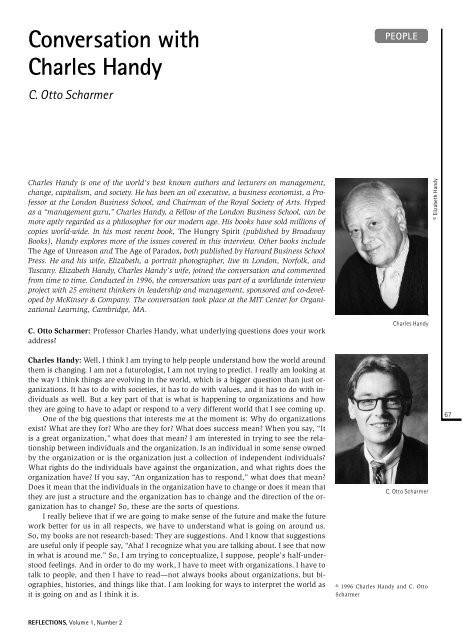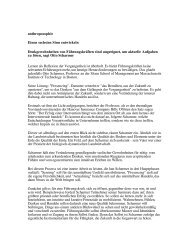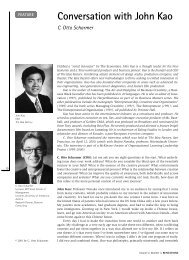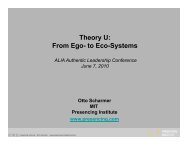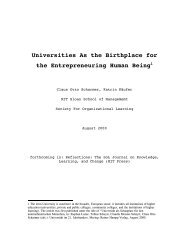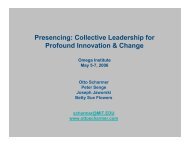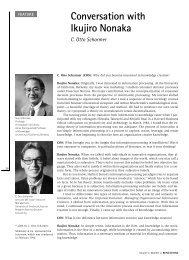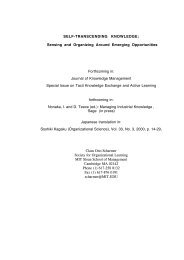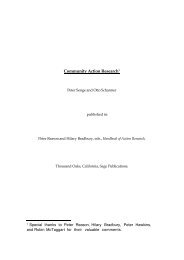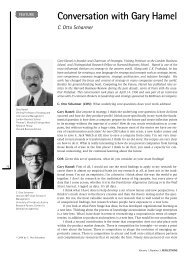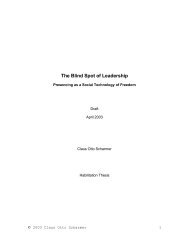Conversation with Charles Handy - Otto Scharmer
Conversation with Charles Handy - Otto Scharmer
Conversation with Charles Handy - Otto Scharmer
Create successful ePaper yourself
Turn your PDF publications into a flip-book with our unique Google optimized e-Paper software.
<strong>Conversation</strong> <strong>with</strong> <strong>Charles</strong> <strong>Handy</strong> SCHARMERCOS: On the one hand, you just said, “We have to understand what is going on,” and onthe other hand, in your more recent writings, you point out that it is not possible to understandwhat is going on. So, how do these relate to each other?<strong>Charles</strong> <strong>Handy</strong>: Well, I think you can somehow make sense of much that is going on,but then you have to make up your own mind, and each organization has to make up itsown mind. The good thing about this rather more chaotic world that we are entering intois that it allows a lot of freedom, both for individuals and for organizations to take controlof their own destiny. And that means that they have the responsibility to work outthe future they want. So, what I mean by understanding is understanding the chaoticnature of the world. It is not fixed, it is not programmed, it is not laid down that it willevolve in a particular way. We can shape it; we can change it. It is that kind of understanding,the understanding of why it is like that. The piece of paper is blank, you canwrite on it what you want.I suppose I try to suggest some of the things that people might write on the paper,some of the aims they might have in life, but I can’t tell them which is right and whichis wrong. I have argued, for instance, that in general I think organizations should striveto last forever—that it should be their attempt to be immortal. They will probably notsucceed, but one of the interesting things that is given to institutions but not to humanbeings is that they can last forever—at least for hundreds of years. The college I went toat Oxford is 670 years old. That is close to immortality.COS: But isn’t that a little bit of the Western way of religious conceptualization, so thatyou strive for eternal life rather than the more cyclical approach, which could mean tohave a rebirth or to have several lives <strong>with</strong>in one institution?<strong>Charles</strong> <strong>Handy</strong>: You could interpret this in different ways. I would argue that in order tobe immortal you have to re-create yourself all the time. So, you can say that is a form ofreincarnation.COS: I see.<strong>Charles</strong> <strong>Handy</strong>: The same soul goes on, only in different bodies. This is a dangerous wayof thinking, because it would say that you must allow yourself to die, whereas I think thatif you want an organization to thrive, the aim should be to stay alive. But in the process youwill have to change dramatically every so often. I mean, my college at Oxford is in no waythe same. Some of the buildings are the same, but what goes on there is quite different.68COS: So, you think just the other way around: that the institutional body remains thesame but that the soul is changing or transforming.<strong>Charles</strong> <strong>Handy</strong>: Mitsui has lasted 600 years. It has changed its nature dramatically, butits name remains the same. They say that the essence has stayed the same. At any onetime, it is the will to preserve the essence of the organization that people are striving for.What they do <strong>with</strong> that essence—the actual outward form, the products they sell, theprocesses they use, people—those can change. I am not sure if I can distinguish which isthe soul and which is the body. But, what I am sure of is that if you don’t strive to keepsomething alive, then it is too easy to give up. It is too easy to treat it as a temporary phenomenon,a piece of property that you want to develop and sell.The organizations that I admire are the ones that have managed to change radicallyand managed to stay alive...a paradox. In order for us to do that—to change, to survive,to last beyond the grave—you have to be profitable, you have to generate money, and youhave to keep your financiers happy. You have to keep your customers happy. You have togenerate new products. You probably have to change the structure quite often to makenew alliances, to grow, or to shrink. All these things have to happen. So, to stay the same,you have to change. This is the interesting dilemma and a very important one. Think aboutit: If you keep mending your sock until none of the original sock is still there, is it still thesame sock? Most people would say yes, because it has been such a continuous process.Volume 1, Number 2, REFLECTIONS
Certainly the reason that you mend the sock is that you want the sock to survive. And thereason you change the organization is that you want the organization to live on.Elizabeth <strong>Handy</strong>: And it is really for the people that the organization continues?<strong>Charles</strong> <strong>Handy</strong>: Well, that is a very good question. I mean, in the American ideology ofcapitalism, it is not for the people in the organization; it is for their financiers. That willnot be enough to sustain the organization, because the easy way to satisfy the financiersis to sell the organization. So, it is rather like my sock: You mend the sock to keep thesock going. Even at the end, when you changed it so often that it is not the same sock,still in a way, it is the same sock. But, you wouldn’t bother to mend the sock unless youwanted to go on using that sock—you would just throw it away. So, the whole motivationfor change, it seems to me, and therefore for learning, development, and growth, isthat we want to continue as long as possible.<strong>Conversation</strong> <strong>with</strong> <strong>Charles</strong> <strong>Handy</strong> SCHARMERCOS: With regard to the big question you mentioned—why do organizations exist? whatare they for? who are they for?—what are your key findings?<strong>Charles</strong> <strong>Handy</strong>: Well, findings is not the kind of word that you can really use to describewhat I do. Suggestions is as far as I would actually go.COS: Okay.<strong>Charles</strong> <strong>Handy</strong>: The suggestion that business organizations are essentially the property ofthe shareholders and that the shareholders are the people who have paid the money forthem is the kind of understanding that underpins Anglo-American capitalism. I do not thinkthat that is a sustainable concept of the organization, and I have suggested that it is nowadaysmuch more sensible to regard organizations as living communities of people, becausethe principal assets of a modern business organization are literally its people. This was notso a long time ago. The principle assets were bricks and mortar or machines or boat or materialsof some sort, and you hired people to make them work for you. But now, the physicalassets are perhaps one-tenth of the value of the company.So, if organizations are communities, then it is wrong toregard communities of living people as being owned by anybody.Let’s talk the right sort of language: People don’t ownother people in a modern democratic society. If this suggestionis taken seriously, it again raises big questions about therelationship between the stockholders and the employees.COS: And other stakeholders.People don’t own other people ina modern democr atic society . Ifthis suggestion is taken seriously ,it again r aises big questions aboutthe relationship between thestockholder s and the employees.<strong>Charles</strong> <strong>Handy</strong>: And other stakeholders, but those are theprincipal ones that are affected. The employees have to begiven more rights, and the stockholders have to have less power, because the stockholdersare not particularly interested in this community living forever. They are only interested,really, in making money out of it or at least getting their money back. Some of theresearch says that the stockholders do actually take a longer term view than people think,but I still don’t think they are particularly concerned <strong>with</strong> the existence of the organizationbeyond 5 or 10 years, maybe. Even the employees of a community don’t really lookmuch beyond the grave. They really, really want the company to exist as long as their lifetimein that community. I think that it has to be a much longer term view than that, actually,to give the company the drive that I think you need for learning, adaptation, andlong-term investment.69COS: So, what would such a constitutional foundation actually look like?<strong>Charles</strong> <strong>Handy</strong>: It would be a constitution based on a set of rights. I am arguing that thefinanciers have certain rights. They would be rights equivalent to people who hold aREFLECTIONS, Volume 1, Number 2
will get a little more at the end—a bonus. Yes, they are partners. I call them members. Idon’t like the word employee; that implies that they are employed by someone.COS: And you are saying they’re not employed by anyone.<strong>Charles</strong> <strong>Handy</strong>: Yes, they have entered into a voluntary agreement to work and to increasethe added value of this organization. They receive a monthly payment in advance of that. Ifyou want to get into more of the implications for practical things, I am not saying that thismembership or partnership status is given to everyone. You have to have been around for abit to have shown your worth to the organization, to be valued by them, to be committed toit, and then you become a member. So, the numbers in the core of the organization who areeffectively members or partners is really relatively small, and much of the organization’swork is then delivered to it by smaller organizations, who also have partners, plus outsideindividuals who are called in and part-time workers who do not have the status of members.And that is what you begin to see happening. They don’t call it that yet, but theyare giving more and more people a share of the bonuses. They are giving more and morepeople stock option schemes. They are effectively creating membership mechanisms.And what I am doing is conceptualizing what they are aiming for, though they don’tknow it. And I am saying that the stock exchange is becoming more and more of a bettingring in which you don’t really own when you buy a share—you are not really buyinga share of the ownership. You are really taking a bet that this organization is goingto do well, and your bet will be worth more money in 10 years’ time.<strong>Conversation</strong> <strong>with</strong> <strong>Charles</strong> <strong>Handy</strong> SCHARMERCOS: Do you see any structural changes in regard to the company-customer and the company-communityrelationships?<strong>Charles</strong> <strong>Handy</strong>: The customers: I don’t see much need for change, because it is self-correcting.If you don’t take proper account of your customers, they will leave you. So, customershave rights built into the market contract. They don’t need to be represented inany formal sense inside the company. Their views should always be dominant, because<strong>with</strong>out customers there is no point in going on if we’re talking about a business or, indeed,a hospital or school for that matter. I think the same applies to suppliers. If you aresensible, you will make sure that their interests are aligned <strong>with</strong> your interests.The surrounding community is a more debatable point. I would argue that if an organizationsees itself as lasting for 100 years and it really believes that or wants to last for100 years, it will take an interest in its surrounding community. I mean, longevity—the lure,the desire to be immortal—makes you take it seriously. If you are only going to live in ahouse for 3 years, you won’t really care about the local schools. If you are going to makeyour life there and you want your children to live there, you will take it more seriously. Soagain, if we adapt this view that we last forever, these things self-correct.71COS: In rethinking what organizations are all about, new structures or new realities emergein regard to relationships between organizations. So, how can different types of organizations,like family firms, small or medium-sized companies, survive along <strong>with</strong> giants?<strong>Charles</strong> <strong>Handy</strong>: Well, I think the interesting thing is thatthese days small things can do very well, provided they arelinked into big things. The richest country in Europe isLiechtenstein; the second richest is Luxembourg.COS: Yes, good point.. . . small things can do very well,provided they ar e linked into bigthings.<strong>Charles</strong> <strong>Handy</strong>: They have survived because they have a cohesion, but in a bigger context.Quebec, if it had separated from the Canadian federation, would actually have donevery well in my view, because they would have negotiated a looser relationship <strong>with</strong> theCanadian federation, and the cohesiveness of being a Quebecois would have given thema new energy, and so on.So, what is happening, it seems to me, is that organizations are looking for the kindREFLECTIONS, Volume 1, Number 2
<strong>Conversation</strong> <strong>with</strong> <strong>Charles</strong> <strong>Handy</strong> SCHARMERof cohesiveness and energy and excitement that you get from being small, but also wantingthe great benefits of being large. And really, it is this that drives my concept of federalismas being the appropriate business model and societal model. I do actually thinkthat federalism is a way of allowing small things to ride on the back of big things so thateverybody benefits. Federalism is a negotiated arrangement that is centralized, in somerespects, decentralized in other respects. It is both-and. In what respects it should be centralizedand in what respect it is decentralized has to be negotiated.COS: So you see federalism not only as a concept for organizing <strong>with</strong>in corporations butalso as a concept for organizing between corporations.<strong>Charles</strong> <strong>Handy</strong>: Oh, absolutely. Federalism basically arises because separate organizationswish to organize together. In order to get back to where they were or should havebeen, organizations have to dismantle themselves into federalism. And that proves verydifficult to do, because it is moving from monarchy or centralized rule to a much moredispersed system of power. And no monarch willingly gives away power.COS: Unless they are named Gorbachev.<strong>Charles</strong> <strong>Handy</strong>: Unless they are named Gorbachev, facing disintegration; or unless theyare, as Gorbachev would claim, visionary; or unless they are effectively about to fallapart anyway and clinging onto something. But the normal way the federations arise isthat small states come together and say, “We need each other.” And so, I really see federalismas the appropriate mechanism for small organizations to actually organize, asyou say, between organizations.COS: Couldn’t that be a confederation, rather than a federation?<strong>Charles</strong> <strong>Handy</strong>: A confederation is not enough in my view. A confederation is a voluntaryassociation <strong>with</strong> no center, so it has its uses, but it falls apart under any kind of attack.Federation is a system in which the individual states have actually granted certainpowers to the center.In a business situation, the ultimate power resides in these small organizations only ifthey have yielded power into the center. They don’t want to break away, because then theylose the advantages of bigness, but if the center is too overpowering, it pulls things toomuch. But yes, you’re absolutely right. The difference between a confederation and a federationis crucial, and I am not saying that confederations are much use; it is the federations.72COS: The concept of federalism has two main structural components. One is the verticaldimension, where the concept of subsidiarity is applied, and the other one is in that morehorizontal dimension, where you are arguing for a differentiation between different functions,like the legislative, the executive, and the judicial function. I would be particularlyinterested in the latter dimension, because it seems to me the most crucial one and it isnot really conceptualized in our current institutions.<strong>Charles</strong> <strong>Handy</strong>: Well, it is very important. Federalism is about a balance of power, always,between the center and the parts. And it is all about the parts giving authority tothe center to do things. Therefore, it is very important that you separate out these functions.For instance, the legislature—let’s call it, for businesses, the policy-making body—has to be done by a body that is representative of the parts. Of course, the actual policiesare drafted and put up, posed as possibilities by an executive, but in the end the decisionson policy have to be taken by a representative body. Now, that body is representativeof the member states, it is not representative of the shareholders. So, I am not talkingabout the board; the board is something else again.COS: That would essentially be a completely new institution.<strong>Charles</strong> <strong>Handy</strong>: Well, in some cases, it’s already there in a management team, if the man-Volume 1, Number 2, REFLECTIONS
agement team is made up of the heads of the main operating units. In some cases, itwould be new but, in many cases, it exists as an informal arrangement. Businesses calltogether a strategic conference once a year, they bring together the top 300 people in theorganization, and they outline their strategy ideas. This is an informal sounding arrangement.I would like to formalize it, because the important thing is that states own the policies,psychologically own them, because they contributed to the decision. Only then canthe executive carry these things out, only then can the executive really operate efficiently.If it is an imposed strategy by the executive on the constituent bodies, as it is often at themoment, there is endless trouble, really.And then there is the judicial function: This is what you might call the inspectorate.Think of the people who actually see that things are done as they should be done. Thatif we say that we are an ethical corporation, we are. If we say that we maintain thesekinds of qualities, we do. If we say that we pay people in a sort of way, we do. It is asmall body, but it should again be independent.In a monarchy, to get power you concentrate all theseFederalism is about a balance ofpower, always, between the centerand the parts.three functions in one person. So, you make the policy, youcarry it out, and you check the stuff. That is too much concentrationof power. In the federal system, the individualorganizations will not give that much power to the center.The center doesn’t like giving these things away, but if theyexist, they have to. And you may have a board of outsidepeople representing the shareholders, to make sure that their interests are looked after.<strong>Conversation</strong> <strong>with</strong> <strong>Charles</strong> <strong>Handy</strong> SCHARMERCOS: Which of the functions you described would that be?<strong>Charles</strong> <strong>Handy</strong>: It would be different. The board is not necessary, in my view, becausethe market should automatically take care of that. The share price goes down, etc. At themoment, it seems to me that the structures of capitalism are inefficient. The board is supposedto take the long-term policies, but the board is supposed to represent the shareholders,and the shareholders are interested in their medium-term earnings per share. So,I don’t think they are the right body to take the decisions for the whole community. Andthe executive at the moment is supposed to be the servant of the board (i.e., the servantof the shareholder), and that doesn’t seem to be the right relationship.COS: And the right relationship would be servants to—<strong>Charles</strong> <strong>Handy</strong>: To the policy-making body, which is the representative body of all the states.COS: And then the executives would be elected by that body?<strong>Charles</strong> <strong>Handy</strong>: Appointed.73COS: Do you see, then, each individual performing only one of the three roles you described?Or do you see this as three parallel action spaces, and each individual could playin one, two, or even in all three of these arenas?<strong>Charles</strong> <strong>Handy</strong>: Well, to some extent, it is parallel action spaces. For instance, one memberof one of the states could be a member of the inspectorate, as I call it, or the judicialreview body. But, if somebody is a member of all three, that makes him too powerful.The thing is to spread power around, but concentrating the actual execution of that powerin small, compact teams in the center and then in the individual states. Unless the individualbusiness units get involved in the general policy making, they will in the end driftaway or find other federations to go to if they don’t have some power.COS: This is a crucial point, isn’t it? Does it affect whether or not there is a rule for exitingthe federation?<strong>Charles</strong> <strong>Handy</strong>: Well, you can have rules, but if you can’t enforce them, they are notREFLECTIONS, Volume 1, Number 2
<strong>Conversation</strong> <strong>with</strong> <strong>Charles</strong> <strong>Handy</strong> SCHARMERmuch use. There are five elements to federalism and we have talked about two:subsidiarity (responsibility at the lowest point) and the separation of functions at thecenter. But there are three more, of which perhaps the most important is interdependence.The way you hold parts, the individual states, into the whole is not just through a contractualconstitution but because they would not survive very easily outside. Several ofthe functions that they need in order to perform effectively are done by other membersof the federation. We can’t actually take Massachusetts out of the United States, becausethe state needs the corn grown in Kansas or financial operations on Wall Street or whatever.There is an interdependence, and it is very important to structure that in. There is acoordinating device which insures that no one particular business unit could do it all byitself. Of course, there are also inefficiencies in coordinating, but it does mean that it ismore difficult to break away, unless there’s another federation that also has those samecoordinating devices. But not only does that stop breakaways; it also means that you feelthat you have to invest in the total federation, because you get something from it as wellas giving something to it. This is this other idea of twin citizenship. You have this emotionalcommitment to your individual unit, but you also have an emotional commitmentto the whole federation.COS: The last issue that I would like to address involves both the concept of paradox andhow to deal <strong>with</strong> paradoxes and the concepts of the multiple cultures, as you argued forin Gods of Management. You described four different modes of doing things or four differentmodes of cultures, and it is very intriguing to me, seeing how they emerge and reemergein different relationships and different realities. What is the underlying conceptthat makes the integration of these diverse concepts possible?<strong>Charles</strong> <strong>Handy</strong>: While I think they are related, I think there are two different issues. Idon’t think I have dealt <strong>with</strong> the question of paradox as well as I would like. What I amtrying to say is that there is almost a necessity of contradictions in life. In order to haveblack, you have to have white. Otherwise, it doesn’t seem like black.COS: And otherwise you don’t get color.74<strong>Charles</strong> <strong>Handy</strong>: You don’t get color. Leisure has no meaning unless there is also work oreffort. Valleys don’t exist unless there are hills. There is a logical necessity for oppositesor contradictions in life. And that applies throughout. We are used to it in the examples Ihave just given. We have learned to live <strong>with</strong> black and white, even if we don’t like black.But we don’t seem to have learned to live <strong>with</strong> that in the rest of the world. I’m trying tosay that in organizations, it is both-and, not either-or.We have created an ideal form or organization whereby we say we can have, forinstance, total control in the center, and you can be an individual. People say, “Well,that’s not possible. If you control, obviously you don’t trust me.” I’m saying, obviouslyyou can, but you have got to live <strong>with</strong> the seesaw. You have got to live <strong>with</strong> the fact thatone time you need control and sacrifice your freedom, and another time you need thefreedom and sacrifice some control. Life is always like that. I think we have got to trainpeople to live <strong>with</strong> what looks like confusion but is actually the necessity to alternatebetween valleys and hills all the time. You really can’t have both at the same time, butyou can have both in the same field.COS: I see.<strong>Charles</strong> <strong>Handy</strong>: I don’t think I explained it very well in the book, but it seems to be veryimportant: that you can have a very strong leader and very strong individuals. You probablyhave the two, not at the same time, but in the same place or the same field. But atthe same time, they fight against each other. So, sometimes the leadership has to actuallylet the individuals be strong. To some extent, that applies in the same way to theGods of Management, which I think is one of my most neglected books in America. I amvery fond of that book. It has the seeds of all of my other books in it, really. I am fond ofit because I think it helps people to understand the confusions of organizations quiteVolume 1, Number 2, REFLECTIONS
well. What I’m saying is that there are four very distinctcultures or styles, management, or organization that youcan find pure examples of anywhere, really. And the realityis that they are all there at the same time. To be moreaccurate—in the same organization in the same field.COS: Talking about your experience—the most crucialchallenge probably is to make these different cultures talk<strong>with</strong> each other and understand each other and to makethem have a dialog <strong>with</strong>in companies.<strong>Charles</strong> <strong>Handy</strong>: There are two. The first challenge is tomake sure you have the right mix of cultures in the firstplace. The second is that they have to talk to each otherand live <strong>with</strong> each other. I guess the whole underlyingtheme of my work is that if you understand differences,you can behave more appropriately. If you understand,you feel less confusion; if you understand, you feel lessstress; if you understand, you can moderate your own behavior.If I know what dress is expected of me in a situation,I can dress. A lot of great problems <strong>with</strong> our children,for instance, who wanted to express their individuality intheir clothes when they were young teenagers, was gettingthem to understand that in certain occasions, it was moreappropriate to dress like adults, even if they didn’t like it.As they grew older, they began to understand that thatwasn’t actually denying their individuality, it was just thatit would be easier for other people to accept them and forthem to merge into the thing if they actually dressed in theright uniform. Understanding helped them change and adapt their behavior. This is whatthat book is all about: understanding and understanding differences. The paradox aboutunderstanding is the necessity of contradictions.And I don’t think understanding is enough. You have to do, and you have to reflect.We haven’t talked about learning. Learning to me is experiment, it is curiosity, a questionfull of life. Learning is experiment followed by reflection. And in that process, you needideas, you need concepts to explain, to experiment. And in my view, most organizationsare about experiments but <strong>with</strong>out the questions, <strong>with</strong>out the reflection, <strong>with</strong>out the ideas.Somebody said that learning is experience understood in tranquility. So, you haveto have the experience, and then you have to understand it. In order to understand it,you have to have the urge to understand it. You have to have the questions in your mind,the curiosity, and you have to have the ideas, the concepts that will explain it. And youhave to have the time, the reflection, to do it.The discovery is the whole process. Learning is discovery,isn’t it? Discovery is curiosity, the stepping into theLearning to me is experiment, it iscuriosity, a question full of life.unknown, the experiment as well as the concepts and thetime to understand that experiment. It is the whole processof putting the pieces together which is what I think islacking in most organizations. The concepts are in a classroomsomewhere or in a book; the experience is out there. The time for reflection is afterretirement, and the curiosity perhaps never exists, because—© Elizabeth <strong>Handy</strong><strong>Conversation</strong> <strong>with</strong> <strong>Charles</strong> <strong>Handy</strong> SCHARMER75Elizabeth <strong>Handy</strong>: There is no time.<strong>Charles</strong> <strong>Handy</strong>: What I am trying to do, I suppose, is to provide the ideas and, to someextent, the curiosity. If I can make my books interesting enough to read, people start tothink. Now, there are concepts—and they use some but not others—which relate to theirexperience. What I can’t provide them <strong>with</strong>, of course, is a sort of enclosed space for allthese things to happen at once.REFLECTIONS, Volume 1, Number 2
<strong>Conversation</strong> <strong>with</strong> <strong>Charles</strong> <strong>Handy</strong> SCHARMERCOS: Let me ask you one more question, which is: How does federalism relate to learning?<strong>Charles</strong> <strong>Handy</strong>: Well, let me take a step back. I think a federal organization is an idealstarting place for a learning organization, because it is not uniform. So, you can have alot of different ways of doing things in the same organization; people are allowed to bedifferent in many respects in a federal organization. They are coordinated in some respects,they have the same systems in many respects, but it is basically a coordinated setof experiments <strong>with</strong> all the different bits doing their different things. Now, you have tohave curiosity to turn that from experiments into learning. People have to want to knowwhat they are doing. You have to have concepts, and you have to have space for reflection,to think about it. Most federal organizations that I know don’t provide any of these.Instead of curiosity, there is jealousy; instead of concepts, there are just presentations:“How we did it.” But it is harder to create a healthy curiosity rather than envy and jealousyin a nonfederal organization. In a bureaucratic organization, experiments are notallowed because they disrupt the system; it is untidy. They reject it. So, if you have designeda federal organization in which you have created curiosity, a range of experiments,and a set of concepts which people can apply to explain the differences, that is learning.COS: What are the most important questions for future research? What is relevant but unanswered?76<strong>Charles</strong> <strong>Handy</strong>: The big question for me now—and I think perhaps it has to do <strong>with</strong> myage as much as anything—is why? Why do we work so hard? Why do we have these organizationsat all? Why are you so interested in improving them? Why do you want to makethem learning? Why am I living? Why am I working?You know, these are old questions, but it seems to me that if I am demanding of thepeople in organizations that they work hard, that they learn, that they plan to make theorganization so good that it is worth handing onto the next generation, you have to knowwhy? What is so important about this organization? And the answer that it is makingmoney for the shareholders does not seem to justify people consuming their lives fortheir organization. There has to be a very good reason for people giving up their lives toorganizations. There has to be a very good reason, and I am not sure what it is. And Ithink that until organizations find the answer to that, they will not have people learningas much as they should. And until societies can articulate what it is that is importantabout America, they will not hold the country together. People will get selfish.Most of the organizations that I consider wonderful are not in business—and I cansee why. And actually, the organizations that are wonderful will continue even if theyare inefficient, even if they don’t learn very well. I am sure The Red Cross will be herein 100 years time, or MIT. I think overriding all their learning and everything is that theyhave a reason, they have a mission, they know why they are here, and it is not just toearn salaries.I used to send my students into all these different organizations, and they would goto banks and they would go to Ford, but they would also go to schools and to hospitalsand to prisons and to all sorts of places. And they always came back, these businessmen, totally surprised and excited by places like hospitals, primary schools, kindergartens,because they found organizations that had a reason to exist, and people believedin that reason. And these organizations might be terribly inefficient, but people wantedto be there. And they would come away from businesses saying, “Well, it was very efficient,but there was no soul. People were there because they wanted to make money orbecause it satisfied their partners.” Trying to explore why is what I am doing. It is research,it is thinking, it is suggestions. But I think in a way that it is more important thanlearning, if you want to have a great organization.COS: Thank you very much.<strong>Charles</strong> <strong>Handy</strong>: Thank you. It’s been great for me.Volume 1, Number 2, REFLECTIONS


